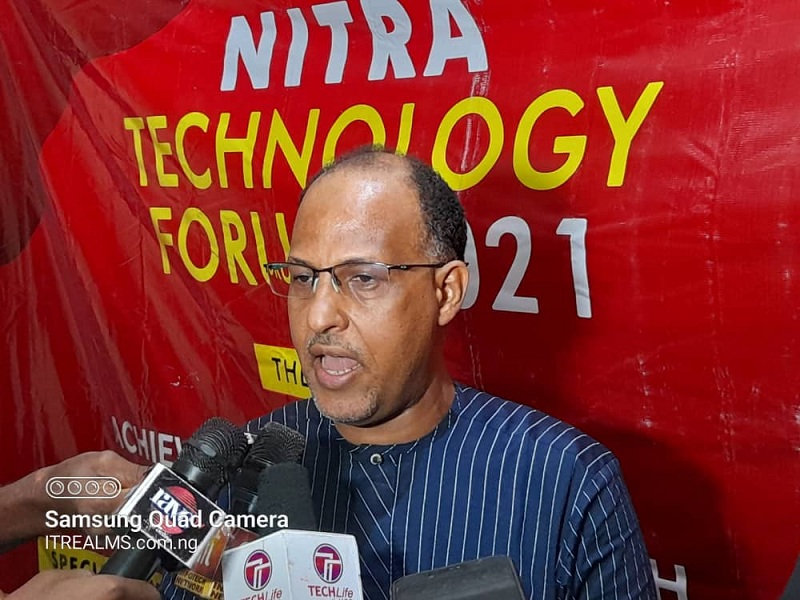Telecom
Rudman Lauds NITRA Role in Advancing ICT Sector

Members of Nigeria Information Technology Reporters’ Association (NITRA) have been lauded for their role in the development of Information and Communications Technology, ICT, particularly in sensitising the public on the importance of local hosting and its benefits for the country.

Mr. Muhammed Rudman, Chief Executive Officer, Internet eXchange Point of Nigeria (IXPN), while delivering his remarks at NITRA Technology Forum 2021 with the Theme “Achieving 30% Growth in Local Cloud Hosting by 2024”, hailed the contributions of the fourth estate of the realm for their incisive reportage of the ICT sector.
Rudman, who has been an advocate for Internet domestication since 2006, noted that NITRA’s effort on Internet domestication was a welcomed development, stressing that, there is still a lot to be done.
He said “We are not there yet, hence the need to sustain the sensitization! With NITRA now raising the flag higher and directed at achieving 30% growth from the existing 60%, over 80% of Nigeria’s Internet traffic should be locally be accessible by 2024.
“The NITRA Technology Forum 2021 is a one-day event aimed at bringing together Web hosting companies, Internet Service Providers (ISPs), Data Centres, Web developers, IT Entrepreneurs and academics from the ICT community in Nigeria to discuss, educate and promote the adoption of local hosting in Nigeria.
“The forum will provide the opportunity for all to learn from industry experts, engage with sponsors and professionals as well as gain business opportunities in the hosting business.
“We need to always remember that Nigeria has the population to grow any business of its choice. We need to focus and plan on how to develop our ICT infrastructure and harness the assets in order to unlock the potential of our huge population.
“As you are aware, data is the new oil, usually coined as “Data is the King”. The reality is that data is the economic engine of the Internet. With billions of US dollars invested annually across the globe towards cloud infrastructure by private and public entities, Nigeria must strive to become the hub for Internet content in Africa not just content consumers.
“Local hosting is critical for any country that wishes to develop its internet infrastructure and empower its citizens as well as ensure national data sovereignty.
“Nigerian government realization of the cloud localization brought about the National Cloud Computing Policy by NITDA in 2019, which is aimed at promoting the migration of National Data to local cloud with a goal of achieving 30% by the end of 2024.
“Some years back the Federal Government of Nigeria also setup Galaxy Backbone PLC, a company empowered to provide Internet and hosting services for government Ministries, Departments and Agencies (MDAs)”.
He further explained that local hosting in Nigeria will reduce the huge capital flight. This reduction, he said will lead to higher quality of service as local hosting enables websites run about three (3) times faster than those hosting overseas because of ultralow latency.
“Hosting of content locally will further strengthen the cyber security of the country, as the passing of data between local networks would be within our national borders.
“It will also ensure business continuity as Nigeria is dependent on submarine cables when hosting internationally.
“These submarine cables are prone to damages by passing ships or due to natural disasters such as a Tsunamis which will definitely mean a disruption to information flow”.
Speaking further on the benefits of Internet domestication, Rudman said hosting of content locally will help build and develop technical skills to manage data centres in the country.
“This, also, inadvertently, means the creation of more jobs for Nigerians and the growth of the technology and hosting industry in the nation.
“It is imperative to host data locally to avoid the complexity of international laws.
“Once important information is being hosted outside the country, the laws of the land no longer apply. Rather, the information and client data hosted abroad are now under the data privacy laws of the country where the data is being hosted.
“With local hosting, organisations and individuals are guaranteed of needed support at the right time, as barriers like time difference and language are no longer an issue.
“I would encourage local hosting for Nigerian businesses as it is a step in the right direction to improve Nigeria’s economy. We need to invest locally. Our business plans should be strategically focused and geared towards developing our country, Nigeria.
“To avoid exporting and re-importing our data, we need to host our data locally. Let us all rise up, embrace the challenge and help develop Nigeria’s ICT ecosystem,” he concluded.
Telecom
US Bans Use of WhatsApp on Official Devices over Security Concerns

United States (US) House of Representatives has banned WhatsApp from all official devices as a result of data privacy and security concerns.

Harry Coker, acting national cyber security (ONCD) Director confirmed this via a statement issued on Monday, June 23 stating that WhatsApp’s high risk classification is attributed to the messaging app’s ambiguous data protection policies, inadequate encryption for stored data, and other potential security vulnerabilities.
He stated that staff have since been advised to utilize more secure communication platforms, with recommended alternatives including Microsoft Teams, Apple’s iMessage and FaceTime, Signal, and Amazon’s Wickr.
However, Nick Clegg, president of Global Affairs for Meta, WhatsApp’s parent company, has strongly opposed the ban.
He said, “We disagree with this decision in the strongest possible terms, whatsApp provides a higher level of security than the other approved apps.”
This ban on WhatsApp is not an isolated incident, it follows previous restrictions on other applications, such as TikTok, which was removed from government devices in 2022.
The decision also comes just months after WhatsApp itself confirmed that Israeli spyware firm Paragon Solutions had targeted some of its users, including journalists and civil society figures.
Telecom
MTN Nigeria Receives UN Women Award for Empowering Women Nationwide

MTN Foundation has received accolades from UN Women, the United Nations entity dedicated to gender equality and the empowerment of women.

The recognition, presented during a profile courtesy visit by UN Women representatives to MTN Nigeria’s Head Office in Ikoyi, Lagos, acknowledged the Organisation’s profound contributions to advancing women’s empowerment across the nation.
The UN Women delegation, led by Beatrice Eyong, UN Women Country Representative to Nigeria, commended MTN and its Foundation for their unwavering commitment to fostering an inclusive society where women thrive.
During the presentation, Beatrice Eyong, UN Women Country Representative to Nigeria, expressed profound admiration for MTN’s efforts. “I want to congratulate MTN for all that they have been doing,” Eyong stated, her voice resonating with appreciation. “And I want to congratulate MTN Foundation specifically, because they are leaving things better than they met them especially with their Mother and Child Initiatives.” Her remarks highlighted MTN’s focused impact, suggesting a significant improvement in the landscape of women’s empowerment due to the company’s interventions.
Odunayo Sanya, Executive Director of the MTN Foundation, received the award and further elaborated on the company’s broader commitment to societal upliftment through women’s empowerment. ” Our Y’ellopreneur program targeted at Female entrepreneurs is about creating access for our Female Entrepreneurs – access to skills, capital and markets. Our commitment is to contribute to the success of women – led businesses in Nigeria.
This focus on economic empowerment through skills development directly benefits women seeking to improve their livelihoods. This recognition comes as MTN Nigeria continues to champion various programmes aimed at uplifting women, from promoting gender diversity within its corporate structure to supporting women-led businesses and initiatives.
The company’s alignment with global best practices, including its recent signing on to the United Nations Women Empowerment Principles (WEPs), further solidifies its position as a leader in corporate social responsibility and gender equality advocacy.
The award serves as a testament to MTN Nigeria’s strategic and impactful investments in creating a more equitable future for Nigerian women.
Telecom
15 African Startups Using AI Selected for Google Accelerator Cohort 9

Google today announced the selection of 15 promising tech startups for its Google for Startups Accelerator: Africa Class 9 program. These innovative startups, hailing from Ghana, Ethiopia, Kenya, Nigeria, Rwanda, Senegal, and South Africa, are leveraging artificial intelligence (AI) to address significant challenges across diverse sectors, including fintech, agritech, healthtech, and professional services.

In an era where startups are at the forefront of solving critical challenges across Africa, these innovators often face significant hurdles to scale their operations, particularly in securing essential support, mentorship, and funding. Programs like the Google for Startups Accelerator: Africa play a crucial role in providing these opportunities, enabling tech founders and innovators to amplify their impact. By bringing together Google’s extensive resources, including cutting-edge AI technologies and a global network of experts, the program aims to equip these startups to not only thrive but also lead in addressing both local and global challenges in this AI era.
The selection follows a highly competitive application process that began in April 2025 , drawing nearly 1,500 applications from across the continent. This cohort underscores Google’s deep commitment to fostering Africa’s vibrant tech ecosystem and supporting startups in their growth journey.
“African startups are at the forefront of solving critical challenges across the continent, and their work with AI is truly transformative,” said Folarin Aiyegbusi, Head of Startup Ecosystem, Africa at Google. “This program reflects our belief that AI can be transformative when shaped by those who understand the context deeply. We are incredibly excited to support these founders who are building for impact and helping to shape an inclusive AI ecosystem across Africa.”
Over the next three months, the selected startups will participate in a hybrid accelerator program (June 23rd to August 22nd, 2025). Participants will receive dedicated technical mentorship from experienced Google engineers and industry experts , up to $350,000 in Google Cloud credits , and strategic support in AI implementation, product leadership, and business growth. They will also gain access to a global network of investors, partners, and collaborators, amplifying their reach and impact.
Since its inception in 2018, the Google for Startups Accelerator Africa program has supported 153 startups from 17 African countries. Collectively, these alumni have raised over $300 million in funding and created more than 3,500 jobs. Google has directly contributed $5 million through a combination of equity-free funding and product credits to support these founders.
The Google for Startups Accelerator: Africa Class 9 cohort includes:
AFRIKABAL (Rwanda): A blockchain and AI-powered platform helping farmers, buyers, and logistics firms trade crops securely and transparently.
Apexloads (Kenya): A logistics SaaS platform helping African freight brokers, forwarders, and transporters move cargo faster with verified partners.
E-doc Online (Nigeria): Simplifies compliance and credit checks by analyzing real-time banking data, enabling faster onboarding and smarter lending decisions.
GoNomad (Nigeria): Enables businesses to start and run global entities, and solopreneurs to professionally invoice and get paid globally like a local.
Midddleman (Nigeria): An intelligent sourcing and payment platform helping African businesses import and pay for goods from China faster, safer, and cheaper.
Myltura (Nigeria): An AI-powered digital health platform enabling remote care, test access, and seamless health data management in Africa.
Pastel (Nigeria): Offers Enterprise AI solutions, inc. AI based fraud detection and anti-money laundering solutions to financial institutions in Africa.
Rapid Human AI (South Africa): An end-to-end AI design-thinking platform that turns ideas into code in days, cutting development time by 80%.
Regulon (Ghana): An AI-powered compliance and onboarding platform designed to simplify regulatory processes for businesses across Africa and the EMEA region.
Scandium (Nigeria): An AI Quality Assurance suite that helps teams ship bug-free software faster with end-to-end test automation and test ops tooling.
Shamba Records (Kenya): An AI-powered platform that empowers 50,000+ African farmers with smart credit, market access, and climate-resilient, data-driven agriculture.
Smartel Agri Tech (Rwanda): Helps smallholder farmers in the Global South get ahead of crop pests and diseases early using AI-powered, solar-driven devices and SMS alerts.
TOLBI (Senegal): Leverages AI and satellite imagery to empower sustainable agriculture across Africa, providing precise crop yield forecasts.
YeneHealth (Ethiopia): An AI-driven digital health web, and mobile app streamlining access to affordable, reliable, quality medications & health care services.
Zerone Analytiqs (Ghana): A transformative two-pronged solution to the data scarcity in Africa, We are revolutionizing how data is sourced, analyzed, and utilized for decisions.
For further information and updates, visit the Google Africa Blog or follow @GoogleAfrica on social media.

 Telecom2 days ago
Telecom2 days agoLebara, New Operator Enters Nigerian Telecom Arena, Sells Minutes, Not Airtime

 E-Business2 days ago
E-Business2 days agoOver 7m Streaming Accounts’ Credentials were Leaked in 2024 – Report

 General News24 hours ago
General News24 hours agoOpenAI Unveils New AI Agent for Software Developers

 E-Financial2 days ago
E-Financial2 days agoFidelity Bank Uplifts Old People’s Home with Essential Items Donation

 E-Financial2 days ago
E-Financial2 days agoS&P Global Ratings Downgrades Ecobank Nigeria’s Credit Rating to CCC-, Outlook Negative

 Telecom2 days ago
Telecom2 days agoPIN Pushes for Equitable Digital Governance at World Internet Forum

 Telecom3 days ago
Telecom3 days agoMTN Says New N6.98 USSD Charge Won’t Affect Airtime Recharge

 Telecom24 hours ago
Telecom24 hours ago15 African Startups Using AI Selected for Google Accelerator Cohort 9




























